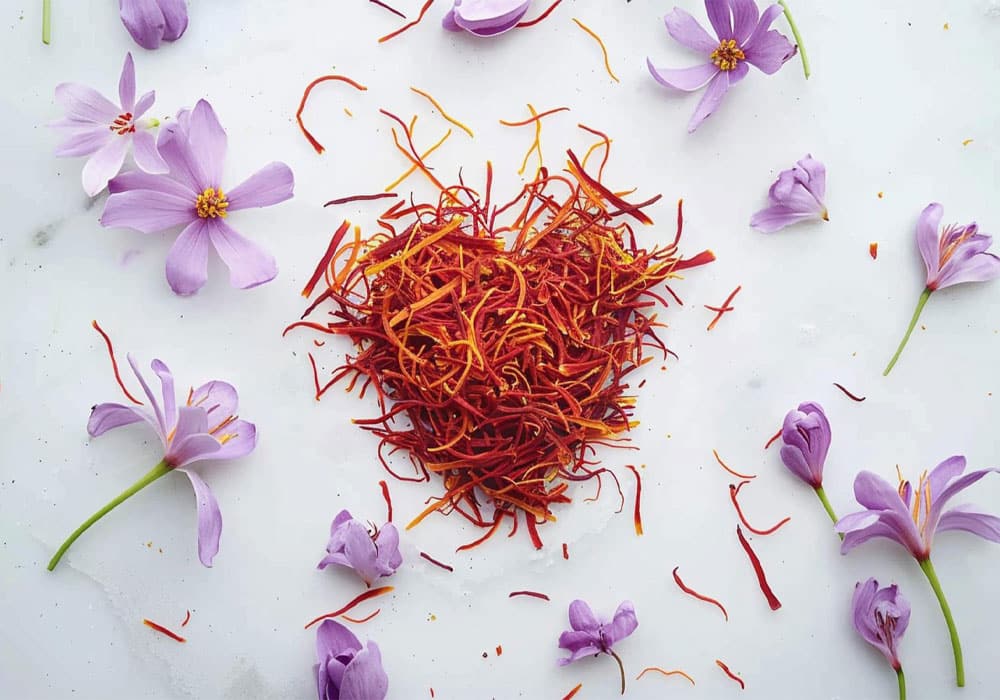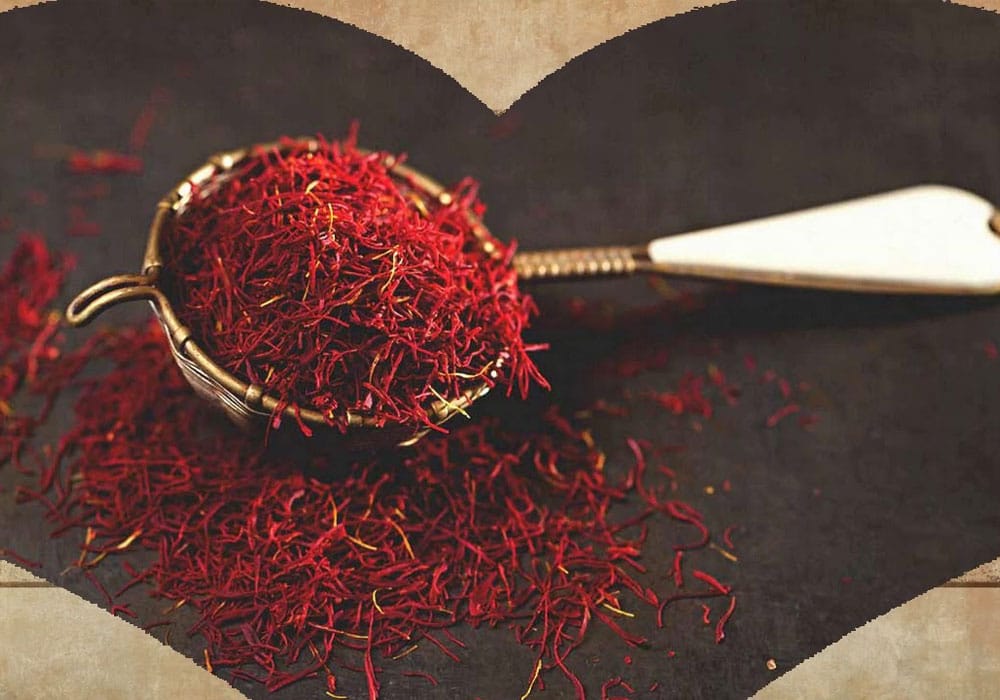Saffron, extracted from the flower of the Crocus sativus plant, has historically been recognized as one of the most expensive and valuable spices. The price of Iranian saffron is very high in global markets due to its superior quality, which has earned it the nickname “Red Gold.” This spice contains unique bioactive compounds such as crocin, safranal, and picrocrocin, giving it numerous medicinal properties, including antioxidant, anti-inflammatory, calming, and even antidepressant effects.
Active Compounds of Saffron and Their Pharmacological Effects
Saffron consists of a complex mixture of chemical compounds, each playing an important role in its therapeutic and biological effects. Crocins, among the most important water-soluble carotenoids, are responsible for saffron’s golden-yellow color and act as powerful antioxidants that can neutralize harmful free radicals. This antioxidant property plays a key role in reducing inflammation and protecting cells. Safranal is a volatile compound that produces saffron’s distinctive aroma and has strong calming and anxiolytic effects on the central nervous system. Picrocrocin contributes to saffron’s bitter taste and is known as the precursor to safranal. Additionally, saffron contains vitamins, minerals, and flavonoids that enhance its anti-inflammatory and antioxidant effects. Together, these compounds make saffron a natural substance with diverse medicinal properties; however, some of these compounds may have complex effects on organs such as the uterus, especially under specific conditions like pregnancy.
Mechanisms of Saffron’s Effects During Pregnancy
Saffron contains several bioactive compounds that can influence physiological processes during pregnancy. Understanding how these compounds affect the uterus and other maternal systems is crucial for evaluating saffron’s safety and potential benefits. This section explores the key mechanisms by which saffron impacts pregnancy, including its effects on uterine contractions, antioxidant activity, and neurological function.
Effect on Uterine Contractions
One of the main concerns about saffron consumption during pregnancy is its impact on uterine muscle contractions. Laboratory and animal studies have shown that saffron extract and its active compounds can increase contractions of the smooth muscles of the uterus. This effect is due to stimulation of muscarinic receptors and increased calcium ion influx into uterine muscle cells, leading to stronger and more frequent contractions. Normally, uterine contractions occur in the final stages of pregnancy and labor, but premature stimulation of these contractions can be dangerous, causing miscarriage or preterm labor. Therefore, high doses or supplements containing saffron are not recommended during pregnancy due to this uterine stimulatory effect. It should be noted that the effect of saffron at low doses, as used in cooking, is not fully understood and may not have significant impact.
Antioxidant and Anti-inflammatory Effects
On the other hand, saffron’s antioxidant properties, primarily due to crocin and flavonoids, may play an important role in protecting maternal and fetal cells from oxidative stress damage. Oxidative stress during pregnancy is associated with DNA damage, chronic inflammation, and even fetal growth problems. The antioxidant compounds in saffron may help prevent these damages by reducing free radicals and inflammation. These anti-inflammatory and protective properties have been confirmed in laboratory studies, but their clinical effects in pregnant women require further extensive research. Generally, controlled consumption of saffron can support maternal and fetal health, but these positive effects should not justify excessive intake.
Neurological and Psychological Effects
Saffron is well-known for its positive effects on the central nervous system, with multiple studies confirming its antidepressant and anxiolytic properties. During pregnancy, hormonal and psychological changes can cause depression, anxiety, and stress, which may threaten the health of both mother and fetus. Low doses of saffron can help improve mood and reduce stress, but this should be done carefully and under medical supervision to avoid possible side effects. The calming effects of saffron may also improve sleep quality in pregnant women, which is an important factor for overall health.
Scientific Evidence and Clinical Studies on Saffron Consumption During Pregnancy
Scientific and clinical studies play a crucial role in evaluating the safety and effects of saffron consumption during pregnancy. These pieces of evidence range from animal experiments to human research, examining both the benefits and risks of saffron use. In this section, the key findings from the most important studies on this topic are reviewed.
Animal Studies
Animal studies are the primary source of data for evaluating the safety of saffron during pregnancy. Experiments on mice, rabbits, and other animals have shown that high doses of saffron extract can increase miscarriage rates, reduce fetal weight, and cause abnormal changes in fetal tissues. These findings suggest that excessive or unregulated saffron consumption can have toxic effects. For example, a study on mice demonstrated that high doses of saffron extract led to increased uterine contractions and eventually miscarriage. These results, alongside the biochemical mechanisms stimulating uterine smooth muscle, raise serious concerns about high-dose saffron use during pregnancy.
Human Studies
Human studies in this area are limited and mostly observational or case reports. Most available evidence indicates that saffron consumed as a culinary spice in typical doses (less than 1 gram per day) is generally safe and does not cause significant side effects. However, rare cases of premature uterine contractions and uterine bleeding following high doses or saffron-containing supplements have been reported. Due to the lack of comprehensive controlled studies, most experts recommend caution and advise against self-administering high doses or saffron supplements during pregnancy.
Risks of Saffron Consumption During Pregnancy
Excessive saffron intake during pregnancy carries several risks, the most important being:
-
Stimulation of uterine contractions and miscarriage risk: High doses of saffron can stimulate uterine muscle contractions, increasing the risk of miscarriage, especially in early pregnancy. This is particularly sensitive for women with a history of recurrent miscarriage or uterine problems.
-
Uterine bleeding: Excessive saffron use can increase the likelihood of uterine bleeding, which in some cases may lead to internal bleeding and threaten the health of mother and fetus.
-
Preterm labor: Overstimulation of the uterus may trigger premature labor, which can have various complications for the newborn.
-
Allergic reactions and sensitivities: Some individuals may be allergic to saffron, and these sensitivities may become more severe during pregnancy. Allergic reactions can range from mild to severe.
-
Drug interactions: Saffron may interact with medications used during pregnancy such as blood thinners, antidepressants, and certain supplements, potentially altering their effects and causing medical complications.
Clinical Recommendations and Safety Guidelines for Saffron Use in Pregnancy
Based on the above information, the most important recommendations for pregnant women regarding saffron consumption are:
-
Limit intake: Using saffron as a spice in small amounts (less than 1 gram per day) is generally safe and may even offer some benefits. Larger amounts should be used cautiously.
-
Avoid supplements and high doses: Saffron supplements containing high doses of active compounds should never be taken without medical advice.
-
Consult healthcare providers: Pregnant women should always consult their doctor or midwife before starting saffron, especially if using non-culinary doses or for medicinal purposes.
-
Special caution in the first trimester: Due to the high sensitivity of the fetus during the first trimester, it is better to avoid or strictly limit saffron consumption during this period.
-
Monitor for abnormal symptoms: If any symptoms such as abdominal pain, bleeding, or uterine contractions occur after saffron use, immediate medical attention is necessary.
Potential Applications of Saffron During Pregnancy
Despite the concerns, recent studies are exploring safe uses of saffron during pregnancy. For example, some preliminary research suggests saffron may help reduce nausea and vomiting, common problems in pregnancy. Additionally, saffron’s antidepressant and calming effects could improve the psychological well-being of pregnant women. Furthermore, its antioxidant properties might help reduce oxidative stress and inflammation in both mother and fetus, providing protective effects. However, these findings are still experimental and require larger clinical trials before becoming practical recommendations.
Buy Premium Iranian Saffron at Competitive Prices from Tida Saffron
Iranian saffron, known as one of the most valuable and highest quality types of saffron worldwide, is always favored by consumers and industry professionals due to its unique aroma, color, and flavor. If you are looking to purchase authentic Iranian saffron that combines high quality with reasonable prices, Tida Saffron is your best choice. Tida Saffron sources its products directly from the finest farms in Iran and offers competitive, affordable prices by eliminating intermediaries and selling directly. This makes premium saffron accessible to all customers. Additionally, Tida Saffron guarantees product authenticity and health safety, allowing you to enjoy the medicinal benefits and excellent quality of this “Red Gold” with complete peace of mind. Whether for home use or large businesses, buying saffron from Tida Saffron is a smart and economical investment that ensures full customer satisfaction.
Conclusion
Saffron, extracted from the Crocus sativus flower, is recognized as one of the most expensive and valuable spices. The price of Iranian saffron is very high due to its superior quality and unique active compounds. This spice contains crocin, safranal, and picrocrocin, which provide multiple medicinal properties, including antioxidant, anti-inflammatory, and calming effects. However, saffron consumption during pregnancy should be approached with caution because high doses may stimulate uterine contractions and increase miscarriage risk. Low doses used as a culinary spice are generally safe, but pregnant women are advised to consult their doctor before using saffron, even as a seasoning, to ensure the health of both mother and fetus.
also read:










